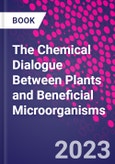The Chemical Dialogue Between Plants and Beneficial Microorganisms provides foundational insights on plant beneficial microorganisms and their impact on the health and productivity of plants. Providing in-depth and recent updates about unexplored aspects of plant microbes interactions, the book includes the biological repertoire of arbuscular mycorrhizal association, molecular architecture of Rhizobium-plant symbiosis, and endophytes in transcriptional plasticity during host colonization by endophytes. The book also includes details about the mechanism of different plant beneficial microorganisms, how these differ, and their cross signaling. This book will be an important reference for researchers working on different plant beneficial microorganisms and their molecular arsenal.
Please Note: This is an On Demand product, delivery may take up to 11 working days after payment has been received.
Table of Contents
1. Molecular dialogues through Trichoderma derived effector-like molecules2. Microbial volatiles-mediated plant growth promotion
3. Microbial plant growth regulators and their role in plant health
4. Language of host plant- Frankia interactions
5. Plant beneficial microorganisms in drought/salinity stress
6. Biological repertoire of arbuscular mycorrhizal association
7. The molecular architecture of Rhizobium-plant symbiosis during nitrogen-fixation
8. Cellular and molecular biology of Rhizobium-plant interaction
9. Transcriptional reprogramming of host plant by the biocontrol agents during biotic stress
10. Transcriptional plasticity during host colonization by endophytes
11. Nitrogen-fixing in nonlegume plants and genomics of nitrogen fixing rhizobium symbioses
12. Common genetic switches of plant symbiotic association with mycorrhiza, rhizobia, and Frankia
13. Role of root-associated fungal microbiota and its contribution to plant phosphorus nutrition
14. Elicitors of plant beneficial microbes and their role in plant innate immunity
15. Microbial secondary metabolites in plant health
16. Rhizoctonia spp. as beneficial and mycorrhizal fungi
17. Role of oxylipins and strerols in inducing Trichoderma in inducing systemic responses
18. Metabolic and genomic traits of PGPR in salinity stress
19. Microbial volatiles in plant promote growth
20. Role of PGPR in induced metabolic and molecular reprogramming during stress
21. Role of halotolerant rhizobacteria in growth promotion and triggering induced systemic resistance in plants
22. Biology of vegetative cells and N2-fixing vesicles of Frankia sp.
23. Bacterial cyclodipeptides in triggers plant immunity
24. Adaptations of Rhizobium from rhizosphere to symbiosis
25. Role nodABC genes and exopolysaccharide of Rhizobium and their role in host determination
26. Role of microbial histone deacetylase modulates multiple responses








